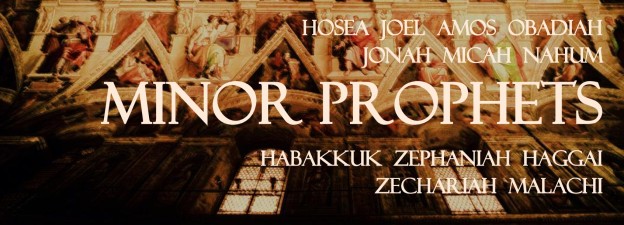"A Prophet Like Me" -- Deuteronomy 18:9-22
 Wednesday, February 20, 2019 at 02:19PM
Wednesday, February 20, 2019 at 02:19PM 
An Introduction to the Minor Prophets (Part One)
When I announce that we are about to begin a series on the “Minor Prophets,” what is your first thought? Ugh . . . They have something to do with the Old Testament? Right? Short biblical books with weird names? Books of the Bible I’ve never read, and are not quite sure why I should?
As we begin a new series on the “Minor Prophets,” we need to know who these prophets were and why they are important to us. The last twelve books found in the Old Testament, the Jews know the Minor Prophets simply as “The Twelve.” Preachers shy away from these books because without spending time to establish a proper context and background, the Minor Prophets are just twelve difficult and obscure books who’s authors speak of events long since past, and of peoples and kings long since dead and gone. Some of these prophets are familiar to us–Jonah, Hosea, Joel, and Zechariah, come to mind. But others are much more obscure: Amos, Obadiah, Micah, Nahum, Habakkuk, Zephaniah, Haggai, and Malachi.
Why cover them? Nine of the Minor Prophets are directly quoted in the New Testament, with hundreds of echoes from all twelve of these prophets found throughout. The Twelve are usually cited in reference to the coming of Jesus and a final judgment at the end of the age. Their message tends to be overtly negative–a call to repentance and a warning of judgment. But the minor prophets have much more to say than that to us even today, and as we will see, they are well worth our time and consideration.
These prophets came on the scene at a time after the reigns of David and Solomon–from about 780 BC-450 BC–when the people God were divided into two kingdoms; Israel–the northern kingdom, and Judah–the southern kingdom. These prophets appear before Israel’s destruction by Assyria in 722 B.C. and Judah’s exile in Babylon 586 B.C. The mission of these prophets; warn the divided people of God what was about to befall them, tell them unless God’s people repent of their sins against YHWH, especially their sin of idolatry, and return to YHWH seeking forgiveness, judgment is sure to come.
But the Minor Prophets speak to other matters as well–matters of national pride, tolerance and then embrace of evil-doing, and social injustice. It is in the latter context they are occasionally quoted or alluded to by politicians–the most common of which comes to mind is the phrase from Amos 5:24, “let justice roll down like a river.” Sadly perhaps, an interest in social justice–not redemptive history–is the only reason why people today are even remotely familiar with these writers and their prophecies. Their importance to us is found in the fact that the Minor Prophets have several common themes warning God’s people of his impending judgment, especially in connection to the grave dangers associated with living among pagans and finding ourselves increasingly drawn to pagan ways, beliefs, and practices.
These twelve prophets are sent by God at a time when the people of Israel (the northern kingdom) and Judah (the southern kingdom) want to be more like their pagan neighbors than YHWH’s covenant with allows of them. God’s people wish to be rid of his law–because keeping it is difficult. They want worship the gods of their neighbors–because their worship is more mysterious and exciting. They want to intermarry with the Canaanites–because they don’t like being isolated and mocked by other nations.
To read the rest of this sermon: "A Prophet Like Me" -- Introduction to the Minor Prophets, Part One



Reader Comments